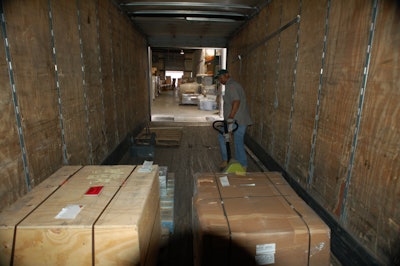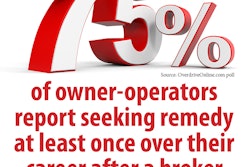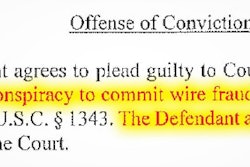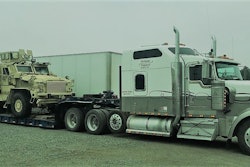Previously in this series: A ‘hit it and move on’ broker scam — and more loopholes
A broker running up bills with no intention to pay is bad enough, but there’s another major reason why owner-operators might see little to no payment in a situation of fraud or insolvency. It’s when the carrier files a claim against the broker’s bond or trust fund, but the money’s not there to fulfill the claim.
Consider the failure of California-based broker Alliance Transportation, which began in 2011, says Dave Carney of Nationwide Transport Finance, a factoring company. Carney provided some testimony in a later class-action case filed by the Owner-Operator Independent Drivers Association against surety trust provider Pacific Financial Association. Its alleged failure to properly act on owner-operators’ claims. The required surety then was $10,000.
 It’s not too uncommon for an owner-operator or small fleet to deliver a brokered load, only to find that payment isn’t coming and that filing against the broker’s surety produces little to no payback.
It’s not too uncommon for an owner-operator or small fleet to deliver a brokered load, only to find that payment isn’t coming and that filing against the broker’s surety produces little to no payback.While claims began to run up in that case in the fall of 2011, PFA didn’t notify the Federal Motor Carrier Safety Administration of cancellation until January 2012, Carney noted in his testimony. He estimates carriers that were not paid by Alliance were due well more than $500,000.
In 2017, OOIDA’s case got new life in Arizona, where PFA is based, after an initial judgment against OOIDA was reversed on appeal. Carney says it was settled for an undisclosed six-figure sum disbursed in large part to owner-operators owed payment.

Alliance was a longtime, reputable broker, but extended too much credit to a large shipper that went out of business, says Daniel Larson, PFA’s CEO. PFA argued that it delayed on Alliance’s cancellation because it worked with Alliance to make payments to carriers for weeks, but “eventually it snowballed and they couldn’t continue.”
Following the passage of the Moving Ahead for Progress in the 21st Century Act in 2012, the broker surety requirement was raised from $10,000 to $75,000. However, in the case of a fraudulent broker rapidly pocketing shipper payments before closing up for good, or in the case of a sudden economic setback, even $75,000 might not cover all the claims against a single broker.
The most common surety instrument is a performance bond, classified as a BMC-84 instrument and regulated as part of the insurance industry. For the price of a premium, the bond provider commits to cover claims up to $75,000.
The U.S. Treasury Department does “an excellent job of policing” bond providers, says the Transportation Intermediaries Association in 2018 comments filed on a proposed rule to implement neglected provisions of MAP-21. A bond company that does not meet the Treasury Department’s standards can be barred from issuing any bond, according to TIA, which represents brokerages.
“Conversely, trust funds have no regulation behind them,” says Chris Burroughs, TIA’s vice president of government affairs. “A lot of fraud is going on there.”
Carney believes that too many trusts exist with virtually “no trust assets pledged” by the broker at startup. In effect, he says, “they have no skin in the game.”
TIA wrote that a trust provider can certify that funds are “readily available to pay claims,” as MAP-21’s mandate states, when in fact “they are not, and there is no process for verification of those certifications currently in place.”
In PFA’s case, Larson says, “I don’t think there’s any problem with oversight” of trust sureties because of the ongoing “very close relationship” between PFA and FMCSA. “They’re very comfortable with the way we handle all our clients.”
Some brokers are large enough to put $75,000 in a trust fund, labeled a BMC-85 instrument. Its fees can be cheaper than the annual premium for a bond.
Bond premiums’ rising costs have reflected what appears to be an increase in broker fraud, says Robert Daye, a sales agent for Bryant Surety Bonds. “Last year, we used to be able to find a premium for a $75,000 bond for someone with strong credit and good experience for $750,” he says. Now it’s difficult to find a premium for those prime customers under $1,300 to $1,500.
The annual cost of a bond, though, can be much higher. The Bryant website says average rates are roughly 3% to 5% of the $75,000, and with bad credit, a broker easily can pay 8% to 13%.
Larson defends the stability and adequacy of trust sureties. PFA built its surety business on trusts, though it now also offers bonds. Industrywide, he estimates about 60% of broker sureties are in trusts. That share for PFA customers is 70%, but Larson believes it’s trending toward 50/50.
“We have by far the largest number of brokers” compared to “any one of our competitors, but we don’t have the majority of brokers,” he says of PFA’s approximately 4,000 clients. While there are “upwards of 18,000 licensed brokers,” he says, “we believe there are actually closer to 12,000 active brokers.”
Just as the vast majority of motor carriers are small, less than 10 or 20 trucks, most brokers also are small operations. “They don’t have the balance sheets to support the premiums’ rates from insurance companies,” Larson says, so they often use trusts, provided by banks.
Daye says Bryant, which doesn’t offer trust-backed surety, has dealt with banks “trying to send people our way” because the banks want to exit the trust business. “They were taking losses” as too many claims came in, he says. “They didn’t want to leave people high and dry.”
In their comments regarding the proposed rule related to MAP-21, TIA and OOIDA asked that trust providers be required to have 100% of the surety in cash or a reputable letter of credit, to be used solely for paying claims. Also, OOIDA recommended that a “trustee’s own ‘internal letter of credit’ ” and other unregulated instruments “of dubious value” should not be permitted.
The association also complained that the current licensing process for surety companies shouldn’t allow “loan or finance” companies to be treated as eligible “financial institutions” because they “are not necessarily monitored by States for enforcement purposes.” –Todd Dills contributed to this report
Next in this series: Growing broker/carrier identity theft schemes reaping millions











